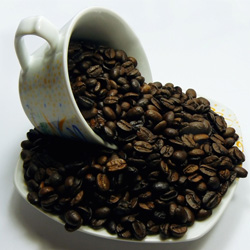Thank This Man For Your Coffee
Sharon Santino,
Nov 17, 2010
 Next time you hit the office coffee pot for another mug of Java, give thanks to a dashing Brazilian officer named Francisco de Mello Palheta. Why? Because of his charms, this bitter brew is no longer reserved for the rich.
Next time you hit the office coffee pot for another mug of Java, give thanks to a dashing Brazilian officer named Francisco de Mello Palheta. Why? Because of his charms, this bitter brew is no longer reserved for the rich.
Flashback 300 years. By the end of the 17th century, coffee had become a popular beverage in Europe, but the French and Dutch tightly controlled the supply of beans. Their monopoly kept prices high, making the drink an expensive indulgence of the aristocracy.
That was all to change in 1727, when Dutch Suriname and French Guiana became deadlocked in a border conflict. The viceroy of nearby Brazil was asked to mediate the dispute.
Seeing a golden opportunity to do more than just end the conflict, the Viceroy sent the dashing Lt. Colonel Francisco de Mello Palheta to French Guiana to solve the border controversy.
Palheta was also given another--and more secret--order: obtain coffee seeds. The Brazilian government had been eyeing Europe's coffee craze with great interest, but up to this point had been unable to obtain any fertile seeds from the French or Dutch.
The Colonel settled the dispute but failed to convince Governor Claude Guillouet d'Orvilliers of French Guiana to give him any coffee beans. Realizing that he could not return home without completing his full mission, Palheta decided to try another avenue - the governor's beautiful wife, Marie.
As legend has it, the handsome Brazilian seduced Madame d'Orvilliers with great success. And when the Brazilian 'Don Juan' left, the smitten Frenchwoman gave him a farewell gift of flowers--with fertile coffee seeds hidden inside.
The rest is, as they say, history. Brazil's climate proved ideal for the beans. The French and Dutch monopoly was broken, and by the 1850s Brazilian coffee flooded the market, making the hot drink accessible to everyone.
Today - with 25% of the market - Brazil is the largest exporter of coffee in the world. In fact, the beans that make your cup from that office pot are probably from this Latin county--all thanks to a charming Brazilian officer and a special bouquet of flowers.


